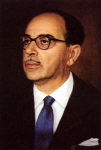| |||||||||||||||||||||||||||||||||||||||||
All 300 seats of the Greek Parliament 151 seats were needed for a majority | |||||||||||||||||||||||||||||||||||||||||
|---|---|---|---|---|---|---|---|---|---|---|---|---|---|---|---|---|---|---|---|---|---|---|---|---|---|---|---|---|---|---|---|---|---|---|---|---|---|---|---|---|---|
| |||||||||||||||||||||||||||||||||||||||||
| |||||||||||||||||||||||||||||||||||||||||
Parliamentary elections were held in Greece on 16 February 1964. [1] They resulted in a clear victory for Georgios Papandreou and his Center Union (EK) party. Papandreou subsequently formed the 37th government since the end of World War II. [2]

Greece, officially the Hellenic Republic, self-identified and historically known as Hellas, is a country located in Southern and Southeast Europe, with a population of approximately 11 million as of 2016. Athens is the nation's capital and largest city, followed by Thessaloniki.

Georgios Papandreou was a Greek politician, the founder of the Papandreou political dynasty. He served three terms as prime minister of Greece. He was also deputy prime minister from 1950–1952, in the governments of Nikolaos Plastiras and Sofoklis Venizelos and served numerous times as a cabinet minister, starting in 1923, in a political career that spanned more than five decades.

World War II, also known as the Second World War, was a global war that lasted from 1939 to 1945. The vast majority of the world's countries—including all the great powers—eventually formed two opposing military alliances: the Allies and the Axis. A state of total war emerged, directly involving more than 100 million people from over 30 countries. The major participants threw their entire economic, industrial, and scientific capabilities behind the war effort, blurring the distinction between civilian and military resources. World War II was the deadliest conflict in human history, marked by 50 to 85 million fatalities, most of whom were civilians in the Soviet Union and China. It included massacres, the genocide of the Holocaust, strategic bombing, premeditated death from starvation and disease, and the only use of nuclear weapons in war.















